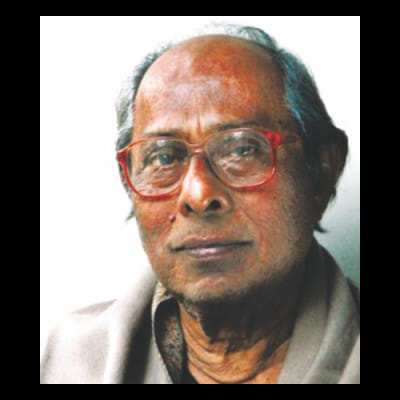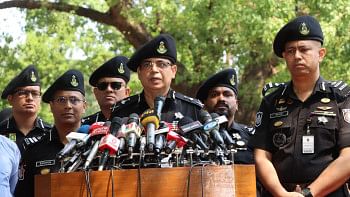"Bangalis are trying to get ahead by forgetting the past"

Born in 1939 in Bardhaman, West Bengal, Hasan Azizul Huq is one of the greatest figures in Bangla literature. He has written short stories and essays that changed the way we see the world. 'Atmoja O Ekti Karabi Gaach', 'Jibon Ghoshe Agun', 'Agun Pakhi', and 'Naamhin Gotrahin' are some of his greatest books. Huq has won numerous literary awards, including the Bangla Academy Award, Ananda Puroshkar and Ekushey Padak. His stories have been translated into English, Hindi, Urdu, Russian and Czech. In a recent visit to The Daily Star, Hasan Azizul Huq talked to Emran Mahfuz about issues ranging from the Partition of India to philosophy.
The Daily Star (TDS): You have been a witness to the Partition of India and the Liberation of Bangladesh. How have these events influenced our culture?
Hasan Azizul Huq (HAH): Let me tell you a story from the Hindu mythology. Shiva and Parvati had arguments on a regular basis as Shiva was becoming too eccentric. One day Shiva cut Parvati into 50 pieces with his chakra and threw the pieces in different places. Each piece eventually became historically significant. We are just like that. Although the people of the subcontinent have distinct customs and traditions, we have a common culture as well.
TDS: How have the lives of the upper and the middle class evolved over time?
HAH: They have no integrity. We are living in a state of restlessness. Everyone is frustrated. Bangalis are losing their cultural identity. They are trying to get ahead by forgetting the past.
TDS: You have extensively written on topics such as the Partition of India and communalism. To what extent have you been influenced by these events?
HAH: A lot of people had to leave their own countries after the Partition. However, I was not affected by it. My elder sister was living in Khulna. That's how I came to this country and started my studies here. We never felt that a separate state was created in the name of Pakistan. But later on, it seemed that the Partition had created a deep wound. Bengal was broken.
TDS: How do you see it as a philosopher?
HAH: I have given a lot of thought to it. I still think about it. Let me tell you something. The Muslims of this country and those of the West Bengal do not feel the same way about the Partition.
TDS: As far as we know, you were involved in student politics. You were even tortured by the then government. Please tell us about that.
HAH: I have not written on this experience. But I do think about the society and the state. One cannot help but think about these things. Man is essentially a political animal.
TDS: Have you ever thought about writing an autobiography?
HAH: A few years ago, I wrote "Phire Jai Phire Ashi." But I do not call it an autobiography. I simply tried to capture the times I lived in. And time is not an empty thing -- it encompasses the society, country and its people. The idea is to find a meaning to life, the way we live it and the struggles we go through to survive. A shorter version was published in " Bhor Belakar Chokhe." The second part is going to be published soon.
TDS: For the most part of your life you have been in the teaching profession. Did you ever think about becoming something else?
HAH: In 1973, I got job offers from the Bangla Academy (as an assistant director) and Rajshahi University. I chose teaching. I thought I could devote a lot of my time to writing if I became a teacher. There would be nobody to boss me around and I would enjoy a certain amount of freedom. When I look back now, I don't think it was a wrong decision.
TDS: As a noted writer and thinker, how do you evaluate the time we are living in?
HAH: All the bloodshed of the people of this country, our sacrifice and the song "Ek Shagor Rokter Binimoye" went in vain. The state has created a system where only a few are reaping the benefits. Bangladesh has a lot of resources but lacks in efficient management. The kind of development that is taking place now is not benefitting the masses. Since it is a democratic country, everybody is now claiming to be representatives of the people. But true democracy has never taken root in this country. In order to bring democracy, politics must be people-centric.
TDS: You are like a mentor to us. What would be your advice to us in these restless times?
HAH: You have to figure out what you want to do and how you would do it. You need proper planning. And you need to find the right cause. Then if you spend even an hour trying to accomplish that, you will be happy.
Translated by Editorial Desk

 For all latest news, follow The Daily Star's Google News channel.
For all latest news, follow The Daily Star's Google News channel. 



Comments